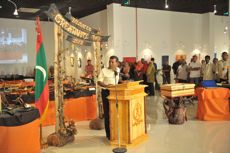“I’m improving my painting, and it’s helping me make improvements in my life. It’s now an interest.”
Adam Arif is four years into a 25-year sentence at Maafushi jail. Participating at the 2012 Inmates Creativity Fair, held in the National Art Gallery from January 12 to 14, he said the arts program has improved daily life at Maafushi, and that the fair was a good chance to see the Male‘ community.
“The art projects allow them to gain valuable skills and hold a normal routine while in prison,” said Mohamed Asif, Assistant Superintendent of the Department of Penitentiary and Rehabilitation Services (DPRS). Inmates who choose to participate in the government-sponsored program work from 9 am to 12 pm, break for lunch, and then again from 1 pm to 3 pm. “It’s like a full job,” he explained. “Otherwise they’d just be sitting behind bars.”
Organised by DPRS, the fair was hosted by inmates and DPRS staff wearing orange tee-shirts sporting the logo “Accept Me”. Paintings, jewelry, handbags, model ships, plant arrangements and even vegetables available for sale were produced by the 80 to 100 male and female participants from Maafushi and Asseyri, most of whom were not formerly artists. They receive Rf900 (US$360) per month.
But business could expand.
“We’ve had a lot of positive comments from people, requesting us to open a shop because they want to buy more. We plan to launch a website to sell the prisoners’ artwork at the end of next month”, Asif said.
With most objects sold by 8:30 pm on the last evening of the fair, Asif estimated that the fair earned Rf1 million (US$64,850). However, he was careful to point out that the earnings are not a profit.
“The money goes back to the government, and is incorporated back into the budget and used to provide more tools for art projects,” he said. “The problem is, actually, we want a revolving fund. We’d like to sell and make a profit and then be able buy more materials and repeat the process. But at the moment, because of legislating governing financial procedures, we aren’t authorised.”
Although the inmate arts program is funded by the government, Asif believes financial autonomy would improve the program. “We are going to introduce a prison club, like the police club, so we can have our own budget to buy and sell,” he explained.
While Asif pushes for independence within the practice of prison reform, he acknowledges that significant improvements have been made in the past few years.
“There is renovation being done at Maafushi, Asseyri, and how they are going to build a new prison at Nanaykurandhoo,” he pointed out. Although the parole system is far from strong, Asif noted that the 2011 Second Chance Program had released 337 inmates since its inception in September, only 30 of whom had returned to prison, mostly from drug relapse.
Maldivian prisons currently house approximately 1000 inmates–0.3 percent of the national population. Nearly three-quarters of the prison population has been incarcerated for drug offences.
According to a 2011 report released by the United Nations Development Program, however, the prison system is poorly equipped.
“The problem in the Maldives is that there aren’t proper prisons,” co-author and UNDP program specialist Naaz Aminath told Minivan News in a previous article. “There is no structure to support the prisoners who are there.”
Inmates surveyed complained about a lack of structure in prison life, listing torture, inhumane treatment, drug availability and false hope from politicians as key factors.
“Plus, there isn’t much to read there,” Aminath explained. Only Asseyri and Maafushi prisons have ‘libraries’–rooms with a few books located outside the gated complex. “It’s risky to go there because it’s not within a protected area, and there simply aren’t enough staff to organise daily library trips. Really, I wouldn’t even call it a library.”
When asked which rehabilitation programs were most needed, inmates most commonly requested religious education (86.4 percent), counseling therapies (76.1 percent) and life skills (75.1 percent).
 While the Second Chance program is re-integrating prisoners into society, other steps are improving the situation behind bars.
While the Second Chance program is re-integrating prisoners into society, other steps are improving the situation behind bars.
In 2011, an education program helped over 100 prisoners prepare for their O-levels. A much-anticipated Drugs Bill was passed during Parliament’s last moments of 2011, re-structuring the court procedures for those accused of drug offenses and offering an overhaul of the rehabilitation system. Asif further anticipates that a Prisons and Parole Bill which was sent to Parliament in June 2010 will be approved by March of this year.
Speaking at the fair’s opening ceremony on January 12 President Mohamed Nasheed, himself a former inmate of Maldivian prisons, said the emerging democratic system and reviews of the Constitution have contributed to improvements in the prison system. The President added that cooperation within the community would be measurable by initiatives taken to formulate prison reforms.
Comparing current prison conditions to those of the former regime, the President further stated that existing and pending legal framework offers a second chance for criminal offenders and asserted that torture and oppression faced by prisoners in this country were a thing of the past.
A comment book at the fair revealed an array of positive public responses. Supportive comments such as “this is the best thing I’ve done in 2012 so far” and “this shows that all the prisoners need is guidance in becoming useful people in society” were interspersed with statements of support from former inmates and suggestions for an inmate’s music group, football team and body-building club.
Likes (1)Dislikes
(1)Dislikes (0)
(0) 
